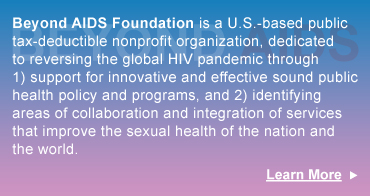Senate Ryan White Hearing Highlights Funding Inequities, Inadequacy of Non-Name Reporting
On June 23, 2005, Senator Tom Coburn, MD chaired a special hearing of the Subcommittee on Federal Financial Management, Government Information, and International Security. (This is a subcommittee of the U.S. Senate Committee on Homeland Security and Governmental Affairs.) The subject of the hearing was "Addressing Disparities in Federal HIV/AIDS CARE Programs."
The hearing examined the effectiveness of CARE Act funding allocations in ensuring that all Americans living with HIV are provided access to core medical services and life saving AIDS medications.
[NOTE: BEYOND AIDS HAS RECOMMENDED ADDITIONAL CHANGES TO THE RYAN WHITE CARE ACT TO IMPROVE THE EFFECTIVENESS OF HIV PREVENTION. SEE LETTER TO THE SENATE AUTHOR OF THIS YEAR'S REAUTHORIZATION BILL, ABOVE IN THIS BLOG.]
You can watch a webcast of the entire hearing, and view and download testimony from the witnesses:
http://hsgac.senate.gov/audio_video/062305video.ram
(Real Player format)
Hardcopies of the hearing, including discussion, will not be available until six months after the hearing date, but may be ordered from the site.
If you do not have Realcom, you may download it from http://www.real.com
Witnesses Testimony:
Robert S. Janssen, Ph.D. , Director , Division of HIV/AIDS Prevention, National Center for Infectious Diseases, Centers for Disease Control and Prevention, Department of Health and Human Services
Deborah P. Hopson, Ph.D. , Associate Administrator for HIV/AIDS , Health Resources and Services Administration, Department of Health and Human Services
Mr. Michael Montgomery, Chief, Office of AIDS , Department of Health Services, Sacramento, California
Marcia Crosse, Ph.D. , Director, Public Health and Military Health Care Issues , U. S. Government Accountability Office
These witnesses were all federal governmental employees, with two of them wearing their US Public Health Service uniforms, and as expected, they would not directly criticize what the government is currently doing and sometimes failed to directly answer Dr. Coburn's leading questions. But the GAO representative, Marcia Crosse, pulled no punches in presenting data showing that the current funding formulas are extremely inequitable, favoring cities that had the earliest cases and got into the funding game first, and underfunding states and cities where the epidemic is more recently spreading.
Senator Coburn did a very good job in emphasizing the need for name-based reporting; and in demonstrating the inequity of current federal funding, which gives San Francisco 38% more per AIDS case than the national average and even gives them credit for deceased cases. An interesting revelation is that CDC has just changed from weakly "advising" states to adopt name-based reporting, to a more formal "recommendation" that they do so.
In response to a question from Dr. Coburn, Dr. Janssen of CDC agreed that states that still have coded reporting will need to change to names very soon in order to have a track record of adequate HIV reporting, so as to allow full federal funding based in part on HIV cases in 2007. Currently, funding is based on AIDS cases, which does not take into account the distribution of HIV infections acquired over the last 10 or so years. That is because it takes 8-10 years to develop AIDS without antiviral treatment, and much longer for patients on treatment.
Although Democrats expressed concern about the 2007 deadline and about redirection of funding to be more equitable, it seems that the Republicans will have Administration support for maintaining the reporting requirement and for more equal funding for each case, regardless of where it occurs.
![]() Return to Articles of Interest
Return to Articles of Interest

